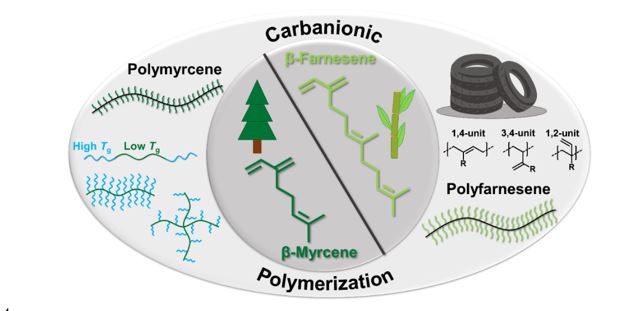Video Article Open Access
Myrcene and Farnesene Copolymers: Towards Bio-Based Thermoplastic Elastomers
Holger Frey1,*, Christian Wahlen1, Axel H. E. Müller1, George Floudas2
1Johannes Gutenberg-University, Department of Chemistry, Duesbergweg 10-14, 55128 Mainz, Germany
2University of Ioannina, Department of Physics, P.O. Box 1186, 45110 Ioannina, Greece
Vid. Proc. Adv. Mater., Volume 2, Article ID 2105218 (2021)
DOI: 10.5185/vpoam.2021.05218
Publication Date (Web): 21 Jul 2022
Copyright © IAAM
Graphical Abstract

Abstract
Biomass-derived materials possess vast potential for material science and industry in the next decades. An increasing environmental awareness increase the demand for sustainable feedstock-based alternatives. In addition to natural rubber (cis‑polyisoprene), the class of terpenes offers a large variety of renewable monomers, like the 1,3-diene monomers β-myrcene and β-farnesene. Living anionic polymerization of bio-based 1,3-diene monomers enables the synthesis of well-defined, high molecular weight block- and copolymers with unique control over polymer architecture and polydiene microstructure. The reactivity of the bio-based monomer β‑farnesene in the statistical anionic copolymerization with styrene and the effect of the bottlebrush-like polyfarnesene structure on phase separation behavior were investigated. Furthermore, thermal and material properties of β-farnesene-based thermoplastic elastomers (TPEs), based on tri- and pentablock copolymers with styrene, and their processing behavior were investigated [1]. As shown by 1H NMR online kinetics, the direct (i.e., statistical) anionic copolymerization of β‑farnesene and styrene in cyclohexane affords block-like, tapered copolymers due to the highly diverging reactivity ratios (rFar = 27; rS = 0.037). The one-pot, tapered copolymer approach was used to synthesize series of tri- (ABA) and pentablock (ABABA) copolymers of styrene (A) and β‑farnesene (B), varying the polydiene volume fraction between 0.50 and 0.68, respectively. Depending on the polydiene volume fraction, the tapered multiblock copolymers showed phase separation in lamellar or hexagonally packed cylindrical structures, as determined by small-angle X-ray scattering. Well-defined tapered tri- and pentablock copolymers with molecular weights of 120 kg∙mol-1 and low dispersity (Ɖ = 1.05–1.16) were generated. The order of the poly(styrene‑co‑farnesene) copolymers bears many similarities (same morphology, practically the same domain spacing) to the corresponding polyisoprene copolymers with the same polydiene volume fraction. The impact of the long alkenyl side chains of the polyfarnesene middle blocks on the mechanical properties of the multiblock copolymers was investigated by tensile testing. The respective tri- and pentablock copolymers of isoprene (C5 unit) and β‑myrcene (C10) with styrene were synthesized as well, containing equal polydiene volume fractions as their β‑farnesene-based (C15) analogs. Mechanical toughness of the polymers increased with decreasing length of the alkenyl side chains (from β‑farnesene to isoprene).
Keywords
Anionic polymerization; polyfarnesene; thermoplastic elastomer, terpene monomers.
References
- C. Wahlen, A, H. E. Müller, G. Floudas, H. Frey et al., Macromolecules 2020, 53, 10397–10408.
Biography
Frey, Holger, Prof. Dr., Born May 05, 1965, Johannes Gutenberg Universität Mainz (JGU), Department of Chemistry, Duesbergweg 10–14, D-55128 Mainz, Germany
Current position: Full Professor (C4), Organic and Macromolecular Chemistry.
1. University training and degree
Study of chemistry, 1985–1990, University of Freiburg/Brsg., degree Dipl. Chem. (1990), Diploma thesis supervisors Martin Möller and Kris Matyjaszewski (partially at Carnegie-Mellon University, Pittsburgh (USA).
2. Advanced academic qualifications
Habilitation: Polymer Science, University of Freiburg, 1998, mentor Rolf Mülhaupt
Doctorate: Chemistry (Dr. rer. nat.), Universiteit Twente (NL), 1993; supervisor Martin Möller
3. Postgraduate professional career
2002–2003, C3 professor for organic and macromolecular chemistry, JGU
2001–2002, Temporary substitute professorship, JGU
1999–2001, “Privatdozent” (lecturer), Albert-Ludwigs Universität Freiburg/Brsg.
4. Other
Awards:
1998 Hermann-Schnell Award of the German Chemical Society (GDCh)
2000 Young Scientist Award of the IUPAC (World Polymer Congress, Warszawa)
2001 Lecturer Award (Dozentenstipendium des Fonds der Chemischen Industrie)
Editorships and Services in Advisory Boards: Associate Editor Polymer Chemistry (RSC) since 2018; Member of the Editorial Boards of Biomacromolecules, Macromol. Chem. Phys., Colloid Polym. Sci.
Member of the Board of the Fachgruppe “Macromolecular Chemistry” (GDCh)
2009-2013 Vice-Dean FB 09 at JGU, “Chemie, Pharmazie und Geowissenschaften”
2013-2015 Dean FB 09 at JGU, “Chemie, Pharmazie und Geowissenschaften”
5. Publications (peer-reviewed: 350 original articles, 37 review articles)
https://scholar.google.com/citations?user=i3nwk7cAAAAJ&hl=en
Video Proceedings of Advanced Materials

Upcoming Congress



